1958 Argentine general election
The Argentine general election of 1958 was held on 23 February. Voters chose both the President and their legislators and with a turnout of 90.6% (the highest in Argentine electoral history).
|
| ||||||||||||||||||||||||||
Presidential election | ||||||||||||||||||||||||||
| ||||||||||||||||||||||||||
466 members of the Electoral College 234 votes needed to win | ||||||||||||||||||||||||||
|---|---|---|---|---|---|---|---|---|---|---|---|---|---|---|---|---|---|---|---|---|---|---|---|---|---|---|
| Registered | 10,002,327 | |||||||||||||||||||||||||
| Turnout | 90.60% | |||||||||||||||||||||||||
| ||||||||||||||||||||||||||
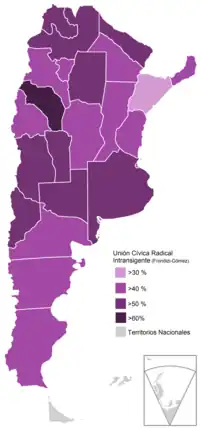 Most voted party by province. | ||||||||||||||||||||||||||
| ||||||||||||||||||||||||||
| ||||||||||||||||||||||||||
187 seats in the Chamber of Deputies 94 seats needed for a majority | ||||||||||||||||||||||||||
| Turnout | 90.86% | |||||||||||||||||||||||||
| ||||||||||||||||||||||||||
Background
The year 1955 cast a long shadow over these elections. President Juan Perón was violently overthrown in September of that year and the succeeding junta banned the Peronist Party and even the possession of Peronist mementoes or the very mention of the former leader or of the late Eva Perón. The junta did, however, convene a Civilian Advisory Board which, to the dismay of many conservatives, recommended against draconian measures or the reversal of most of Perón's reforms. They also called for a referendum ratifying the 1853 Constitution (which Perón had it heavily amended in 1949), while retaining Perón's Article 15, a section devoted to social reforms; the junta's leader, Gen. Pedro Aramburu, backed the panel's findings. An attempted countercoup against the junta, defeated on June 10, led to the execution of 27 plotters (including numerous civilians) and derailed Aramburu's hopes for the creation of a viable political alternative to the populist leader.
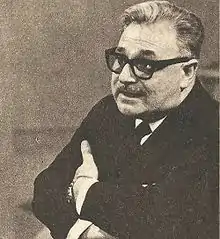
Seizing the opportunity, the Radical Civic Union (UCR)'s 1951 vice-presidential nominee, Arturo Frondizi secretly secured an agreement with the exiled Perón, by which the banned Peronists would be given a voice in exchange for their support. The pact, a mere rumor at the time, created a rift within the UCR at their party convention in November 1956, forcing Frondizi and his supporters to run on a splinter ("Intransigent") ticket and leaving more anti-Peronist UCR voters with Ricardo Balbín, the party's 1951 standard bearer. The two wings presented different candidates for the constituent assembly election called for July 28, 1957, with no clear winner, though the deadlocked assembly did ratify the Advisory Board's proposed constitutional changes.
Unmentionable by law, Perón became the central issue of the 1958 campaign. Argentina was abuzz with the staccato sounds of El-qué-te-dije (roughly translated to "You know who"), as he opposed Balbín, who accepted Pres. Aramburu's endorsement as the candidate of the ruling junta. Balbin, and his Radical Civic Union of the People, was dealt a "February surprise" when, four days before the election, the exiled leader publicly announced his endorsement of Frondizi. Blank votes (Peronist voters' choice during the assembly elections of 1957, which they narrowly "won") became Frondizi votes, making him the winner of the 1958 elections in Argentina.[1]
Candidates
- Intransigent Radical Civic Union (progressive): Former Deputy Arturo Frondizi of Corrientes Province
- Popular Radical Civic Union (centrist): Former Deputy Ricardo Balbín of Buenos Aires Province
- Christian Democratic Party (progressive): Lucas Ayarragaray
- Socialist Party: Former Senator Alfredo Palacios of the city of Buenos Aires
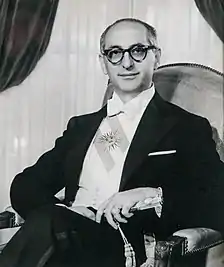 Frondizi
Frondizi Balbín (left)
Balbín (left) Palacios
Palacios
Results
President
| Presidential candidate |
Vice Presidential candidate |
Party | Popular vote | Electoral vote | |||
|---|---|---|---|---|---|---|---|
| Votes | % | Votes | % | ||||
| Arturo Frondizi | Alejandro Gómez | Intransigent Radical Civic Union | 4,070,398 | 49.49 | 319 | 68.45 | |
| Ricardo Balbín | Santiago del Castillo | People's Radical Civic Union | 2,617,693 | 31.83 | 140 | 30.04 | |
| Lucas Ayarragaray Jr. | Horacio Sueldo | Christian Democratic Party | 285,650 | 3.47 | |||
| Alfredo Palacios | Carlos Sánchez Viamonte | Socialist Party | 264,721 | 3.22 | |||
| Héctor González Iramain | Carlos Aguinaga | Democratic Party | 145,935 | 1.77 | |||
| Reynaldo Pastor | Martín Aberg Cobo | Conservative Democratic People's Party | 128,226 | 1.56 | |||
| Luciano Molinas | Horacio R, Thedy | Democratic Progressive Party | 126,991 | 1.54 | |||
| Alejandro Leloir | Juan A, Bramuglia | Popular Union | 80,712 | 0.98 | |||
| Ernesto Meabe | José Brouchou | Liberal Party of Corrientes | 51,092 | 0.62 | 5 | 1.07 | |
| Vicente Solano Lima | Alfredo Massi | Conservative People's Party | 49,784 | 0.61 | |||
| White Party | 40,820 | 0.50 | |||||
| Juan Bautista Peña | Ana Zaefferer de Goyeneche | Independent Civic Party | 39,157 | 0.48 | |||
| Populist Popular Union | 32,119 | 0.39 | |||||
| Red and White Intransigent Radical Civic Union | 31,987 | 0.39 | |||||
| Juan José Tartara | People's Party | 30,957 | 0.38 | ||||
| Conservative Party | 30,239 | 0.37 | |||||
| Traditional Blockist Radical Civic Union | 22,371 | 0.27 | |||||
| Chaco Alliance | 22,338 | 0.27 | |||||
| Labour Party | 20,358 | 0.25 | |||||
| Worker's Party | 16,876 | 0.21 | |||||
| Liberal Democratic Party | 16,611 | 0.20 | 2 | 0.43 | |||
| Basilio Serrano | Juan de Zan | Federal Union | 12,996 | 0.16 | |||
| Provincial Union | 10,722 | 0.13 | |||||
| People's Workers Party and Social Reconstruction | 10,378 | 0.13 | |||||
| Conservative Democratic Party | 10,328 | 0.13 | |||||
| Provincial Defense - White Flag | 9,296 | 0.11 | |||||
| Populist Party | 7,596 | 0.09 | |||||
| Renewal abd Intransigent Radical Civic Union | 7,581 | 0.09 | |||||
| Alejandro Gancedo Jr. | Antipersonalist Radical Civic Union | 7,141 | 0.09 | ||||
| Blockist Radical Civic Union - Conservative People's Party | 6,120 | 0.07 | |||||
| People's Federal Labour Party | 4,427 | 0.05 | |||||
| Autonomist Democratic Party | 2,700 | 0.03 | |||||
| Blue and White Party | 2,593 | 0.03 | |||||
| Formosa Democratic Party | 2,364 | 0.03 | |||||
| National Labour Party | 2,170 | 0.03 | |||||
| Federal Agrarian Labour Party | 1,342 | 0.02 | |||||
| Rafael Claudeville | Renewwal Party | 661 | 0.01 | ||||
| Social Workers Party | 608 | 0.01 | |||||
| Liberal Party of Misiones | 273 | 0.00 | |||||
| Communist Party | 42 | 0.00 | |||||
| Total | 8,224,373 | 100 | |||||
| Positive votes | 8,224,373 | 90.76 | |||||
| Blank votes | 814,802 | 8.99 | |||||
| Invalid votes | 22,724 | 0.25 | |||||
| Total votes | 9,061,899 | 100 | |||||
| Registered voters/turnout | 10,002,327 | 90.60 | |||||
| Sources:[2][3] | |||||||
Chamber of Deputies
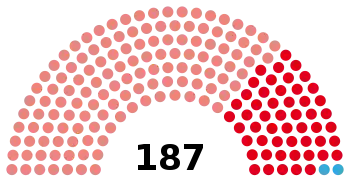 | ||||||
| Party | Votes | % | Seats 1958-1960 |
Seats 1958-1962 |
Total seats | |
|---|---|---|---|---|---|---|
| Intransigent Radical Civic Union (UCRI) | 4,070,398 | 49.33 | 66 | 67 | 133 | |
| People's Radical Civic Union (UCRP) | 2,617,693 | 31.72 | 26 | 26 | 52 | |
| Christian Democratic Party (PDC) | 285,650 | 3.46 | — | — | — | |
| Socialist Party (PS) | 264,721 | 3.21 | — | — | — | |
| Democratic Party (PD) | 145,935 | 1.77 | — | — | — | |
| Democratic Progressive Party (PDP) | 126,991 | 1.54 | — | — | — | |
| Liberal Party of Corrientes (PLCo) | 51,092 | 0.62 | 1 | 1 | 2 | |
| Others | 688,893 | 8.35 | — | — | — | |
| Total | 8,251,373 | 100 | 93 | 93 | 187 | |
| Positive votes | 8,251,373 | 90.79 | ||||
| Blank votes | 814,400 | 8.96 | ||||
| Invalid votes | 22,724 | 0.25 | ||||
| Total votes | 9,088,497 | 100 | ||||
| Registered voters/turnout | 10,002,327 | 90.86 | ||||
| Source:[4] | ||||||
Provincial Governors
Notes
- Todo Argentina
- Cantón, Darío (1968). Materiales para el estudio de la sociología política en la Argentina (PDF). Vol. Tomo I. Buenos Aires: Centro de Investigaciones Sociales - Torcuato di Tella Institute. pp. 175–180.
- Historia Electoral Argentina (1912-2007) (PDF). Ministry of Interior - Subsecretaría de Asuntos Políticos y Electorales. December 2008. Archived from the original (PDF) on 8 September 2014.
- Nohlen, Dieter (2005). Elections in the Americas: A Data Handbook. Vol. II: South America. Nueva York: Oxford University Press. ISBN 0-19-928358-3.
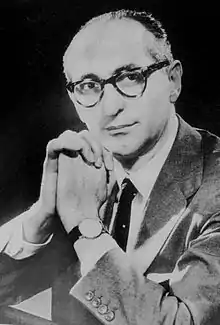
.jpg.webp)

